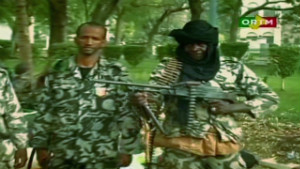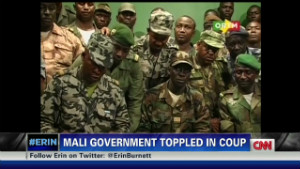- NEW: The African Union voices its "total rejection" of the rebels' independence claim
- Rebels declare independence for territory in northern Mali captured by Tuareg fighters
- France says the declaration is meaningless if other African nations do not recognize it
- Mali, once a beacon of stability, is in the throes of crisis after a recent military coup
(CNN) -- Separatist rebels who recently captured large areas of Mali's vast Sahara region in the north of the country have declared independence for a region they call Azawad.
The declaration was made in a statement posted online by the Secretary General of the Azawad National Liberation Movement.
The claim of independence follows "more than 50 years of corruption and poor governance with the complicity of the army and the politicians, putting people's lives at risk in Azawad," the MNLA said.
The African Union expressed its "total rejection" of the rebels' independence claim in a statement Friday.
African Union chairman Jean Ping "firmly condemns this announcement, which is null and of no value whatsoever," the statement said, and urges the international community to support this position.
The African Union will do all it can to restore the authority of the government of Mali to its entire territory and "bring to an end the attacks being carried out by armed and terrorist groups in the northern part of the country," it said.
French Defense Minister Gerard Longuet said a declaration of independence in northern Mali is meaningless if it is not recognized by African states. France is the former colonial power in Mali.
 Events leading to military coup in Mali
Events leading to military coup in Mali  Erin Burnett's message for Mali
Erin Burnett's message for Mali The Tuareg rebels' seizure of northern Mali followed a military coup last month that toppled the government and threw the country into turmoil.
The rebels called a cease-fire Thursday, saying they had captured key territory in Mali's vast Sahara region and achieved their military mission.
The online statement said the MNLA "decides unilaterally to proclaim an end to military operations as of Thursday, April 5 at midnight GMT."
The Tuaregs consider the area, which they call Azawad, as the cradle of their nomadic civilization and launched an insurgency in January to achieve a separate homeland. The conflict has uprooted more than 200,000 people from their homes.
Buoyed by the chaos after last month's coup, the rebels swept through the north with relative ease and wrested control of several strategic cities, including Kidal, Gao and Timbuktu.
"In all liberated regions, may it be in Kidal, Gao or Timbuktu, the MLNA today constitutes the sole authority providing security to the population," MNLA spokesman Mossa Ag Attaher told CNN affiliate BFM-TV.
The rebels have effectively split the West African nation in two, and northern areas remain volatile and tense, preventing aid agencies from accessing displaced people, the United Nations refugee agency said Thursday.
The Economic Community of West African States, a regional group, met in the Ivorian capital, Abidjan, on Thursday to discuss military intervention in Mali.
The MLNA, however, warned ECOWAS against the deployment of troops.
Attaher told BFM-TV that the rebels have at least 3,000 fighters and any intervention "would be a disaster."
After the March 22 coup, Mali, long a shining example of democracy and stability in Africa, plunged into crisis.
Amnesty International said northern Mali was teetering on the brink of disaster.
Kidal, Gao and Timbuktu have experienced days of looting, abductions and chaos since they were occupied by armed groups late last week, the human rights group said.
In the capital, Bamako, military leaders who overthrew President Amadou Toumani Toure because of his alleged inability to handle the Tuareg rebellion postponed plans Thursday for a national convention aimed at addressing political woes. The reason remained unclear.
Military leaders had planned to invite political parties and civilian representatives to the convention, said Capt. Amadou Sanogo, the junta leader.
The international community -- including West African states, the African Union and the United States -- has called for the immediate restoration of constitutional rule. The African Union and ECOWAS have also slapped the military junta with travel and economic restrictions and have frozen its assets.
ECOWAS imposed a diplomatic and financial embargo, said Ivory Coast President Alassane Ouattara, who is chairman of the group.
"All diplomatic, economic, financial measures and others ... will not be lifted until the re-establishment of constitutional order," he said.
Sanctions targeted the supporters and relatives of the military junta and all those involved in contributing to the "destabilization" of Mali, the African Union said.
Under the sanctions, five neighboring nations will close their borders to landlocked Mali except for humanitarian purposes and deny the nation access to their ports, freeze its accounts in regional banks and suspend its participation in cultural and sporting events.
The U.N. Security Council on Wednesday again called for the restoration of the democratically elected government of Mali and gave its support to the sanctions imposed by regional bodies.
It condemned "the continued attacks, looting and seizure of territory carried out by rebel groups in the north of Mali" and demanded an immediate end to hostilities.
CNN's Kamal Ghattas contributed to this report.


